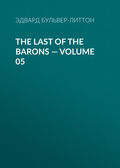
Эдвард Бульвер-Литтон
Pelham — Volume 08
Job then re-entered—minutes passed away—Job re-appeared, and Dawson was dressed, and clinging hold of him—"All's right," said he to me, with a satisfied air.
The oath had been taken—what it was I know not—but it was never broken. [Note: Those conversant with the annals of Newgate, will know how religiously the oaths of these fearful Freemasonries are kept.]
Dawson and Job went first—I followed—we passed the passage, and came to the chamber of the sleeping Mrs. Brimstone. Job leant eagerly forward to listen, before we entered; he took hold of Dawson's arm, and beckoning to me to follow, stole, with a step that a blind mole would not have heard, across the room. Carefully did the practised thief veil the candle he carried, with his hand, as he now began to pass by the bed. I saw that Dawson trembled like a leaf, and the palpitation of his limbs made his step audible and heavy. Just as they had half-way passed the bed, I turned my look on Brimstone Bess, and observed, with a shuddering thrill, her eyes slowly open, and fix upon the forms of my companions. Dawson's gaze had been bent in the same direction, and when he met the full, glassy stare of the beldame's eyes, he uttered a faint scream. This completed our danger; had it not been for that exclamation, Bess might, in the uncertain vision of drowsiness, have passed over the third person, and fancied it was only myself and Jonson, in our way from Dawson's apartment; but no sooner had her ear caught the sound, than she started up, and sat erect on her bed, gazing at us in mingled wrath and astonishment.
That was a fearful moment—we stood rivetted to the spot! "Oh, my kiddies," cried Bess, at last finding speech, "you are in Queer-street, I trow! Plant your stumps, Master Guinea Pig; you are going to stall off the Daw's baby in prime twig, eh? But Bess stags you, my cove! Bess stags you."
Jonson, looked irresolute for one instant; but the next he had decided. "Run, run," cried he, for your lives," and he and Dawson (to whom, fear did indeed lend wings) were out of the room in an instant. I lost no time in following their example; but the vigilant and incensed hag was too quick for me; she pulled violently the bell, on which she had already placed her hand: the alarm rang like an echo in a cavern; below—around— far—near—from wall to wall—from chamber to chamber, the sound seemed multiplied and repeated! and in the same breathing point of time, she sprang from her bed, and seized me, just as I had reached the door.
"On, on, on," cried Jonson's voice to Dawson, as they had already gained the passage, and left the whole room, and the staircase beyond, in utter darkness.
With a firm, muscular, nervous gripe, which almost shewed a masculine strength, the hag clung to my throat and breast; behind, among some of the numerous rooms in the passage we had left, I heard sounds, which told too plainly how rapidly the alarm had spread. A door opened—steps approached—my fate seemed fixed; but despair gave me energy: it was no time for the ceremonials due to the beau sexe. I dashed Bess to the ground, tore myself from her relaxing grasp, and fled down the steps with all the precipitation the darkness would allow. I gained the passage, at the far end of which hung the lamp, now weak and waning in its socket; which, it will be remembered, burnt close by the sick man's chamber that I had so unintentionally entered. A thought flashed upon my mind, and lent me new nerves and fresh speed; I flew along the passage, guided by the dying light. The staircase I had left, shook with the footsteps of my pursuers. I was at the door of the sick thief—I burst it open—seized the sword as it lay within reach on the chair, where Jonson had placed it, and feeling, at the touch of the familiar weapon, as if the might of ten men had been transferred to my single arm, I bounded down the stairs before me—passed the door at the bottom, which Dawson had fortunately left open—flung it back almost upon the face of my advancing enemies, and found myself in the long passage which led to the street-door, in safety, but in the thickest darkness. A light flashed from a door to the left; the door was that of the "Common Room" which we had first entered; it opened, and Spider-shanks, with one of his comrades, looked forth; the former holding a light. I darted by them, and, guided by their lamp, fled along the passage, and reached the door. Imagine my dismay! when, either through accident, or by the desire of my fugitive companions to impede pursuit, I found it unexpectedly closed.
The two villains had now come up to me, close at their heels were two more, probably my pursuers, from the upper apartments. Providentially the passage was (as I before said) extremely narrow, and as long as no fire- arms were used, nor a general rush resorted to, I had little doubt of being able to keep the ruffians at bay, until I had hit upon the method of springing the latch, and so winning my escape from the house.
While my left hand was employed in feeling the latch, I made such good use of my right, as to keep my antagonists at a safe distance. The one who was nearest to me, was Fib Fakescrew; he was armed with a weapon exactly similar to my own. the whole passage rung with oaths and threats. "Crash the cull—down with him—down with him, before he dubs the jigger. Tip him the degen, Fib, fake him through and through; if he pikes, we shall all be scragged."
Hitherto, in the confusion I had not been able to recall Job's instructions in opening the latch; at last I remembered, and pressed, the screw—the latch rose—I opened the door; but not wide enough to scape through the aperture. The ruffians saw my escape at hand. "Rush the b— cove! rush him!" cried the loud voice of one behind; and at the word, Fib was thrown forwards upon the extended edge of my blade; scarcely with an effort of my own arm, the sword entered his bosom, and he fell at my feet bathed in blood; the motion which the men thought would prove my destruction, became my salvation; staggered by the fall of their companion they gave way: I seized advantage of the momentary confusion— threw open the door, and, mindful of Job's admonition, turned to the right, and fled onwards, with a rapidity which baffled and mocked pursuit.
CHAPTER LXXXIV
Ille viam secat ad naves sociosque, revisit.
—Virgil.
The day had already dawned, but all was still and silent; my footsteps smote the solitary pavement with a strange and unanswered sound. Nevertheless, though all pursuit had long ceased, I still continued to run on mechanically, till, faint and breathless, I was forced into pausing. I looked round, but could recognize nothing familiar in the narrow and filthy streets; even the names of them were to me like an unknown language. After a brief rest I renewed my wanderings, and at length came to an alley, called River Lane; the name did not deceive me, but brought me, after a short walk, to the Thames; there, to my inexpressible joy, I discovered a solitary boatman, and transported myself forthwith to the Whitehall-stairs.
Never, I ween, did gay gallant, in the decaying part of the season, arrive at those stairs for the sweet purpose of accompanying his own mistress, or another's wife, to green Richmond, or sunny Hampton, with more eager and animated delight than I felt at rejecting the arm of the rough boatman, and leaping on the well-known stones. I hastened to that stand of "jarvies" which has often been the hope and shelter of belated member of St. Stephen's, or bewetted fugitive from the Opera. I startled a sleeping coachman, flung myself into his vehicle, and descended at Mivart's.
The drowsy porter surveyed, and told me to be gone; I had forgotten my strange attire. "Pooh, my friend," said I, "may not Mr. Pelham go to a masquerade as well as his betters?" My voice and words undeceived my Cerberus, and I was admitted; I hastened to bed, and no sooner had I laid my head on my pillow, than I fell fast asleep. It must be confessed, that I had deserved "tired Nature's sweet restorer."
I had not been above a couple of hours in the land of dreams, when I was awakened by some one grasping my arm; the events of the past night were so fresh in my memory, that I sprung up, as if the knife was at my throat—my eyes opened upon the peaceful countenance of Mr. Job Jonson.
"Thank Heaven, Sir, you are safe! I had but a very faint hope of finding you here when I came."
"Why," said I, rubbing my eyes, "it is very true that I am safe, honest Job: but, I believe, I have few thanks to give you for a circumstance so peculiarly agreeable to myself. It would have saved me much trouble, and your worthy friend, Mr. Fib Fakescrew, some pain, if you had left the door open instead of shutting me up with your club, as you are pleased to call it."
"Very true, Sir," said Job, "and I am extremely sorry at the accident; it was Dawson who shut the door, through utter unconsciousness, though I told him especially not to do it—the poor dog did not know whether he was on his head or his heels."
"You have got him safe," said I, quickly.
"Aye, trust me for that, your honour. I have locked him up at home while I came here to look for you."
"We will lose no time in transferring him to safer custody," said I, leaping out of bed; "but be off to—Street directly."
"Slow and sure, Sir," answered Jonson. "It is for you to do whatever you please, but my part of the business is over. I shall sleep at Dover tonight, and breakfast at Calais to-morrow. Perhaps it will not be very inconvenient to your honour to furnish me with my first quarter's annuity in advance, and to see that the rest is duly paid into Lafitte's, at Paris, for the use of Captain Douglas. Where I shall live hereafter is at present uncertain; but I dare say there will be few corners except old England and new England, in which I shall not make merry on your honour's bounty."
"Pooh! my good fellow," rejoined I, "never desert a country to which your talents do such credit; stay here, and reform on your annuity. If ever I can accomplish my own wishes, I will consult your's still farther; for I shall always think of your services with gratitude, though you did shut the door in my face."
"No, Sir," replied Job—"life is a blessing I would fain enjoy a few years longer; and, at present, my sojourn in England would put it woefully in danger of 'club law.' Besides, I begin to think that a good character is a very agreeable thing, when not too troublesome: and, as I have none left in England, I may as well make the experiment abroad. If your honour will call at the magistrate's, and take a warrant and an officer, for the purpose of ridding me of my charge, at the very instant I see my responsibility at an end, I will have the honour of bidding you adieu."
"Well, as you please," said I. "Curse your scoundrel's cosmetics! How the deuce am I ever to regain my natural complexion? Look ye, sirrah! you have painted me with a long wrinkle on the left side of my mouth, big enough to engulph all the beauty I ever had. Why, water seems to have no effect upon it!"
"To be sure not, Sir," said Job, calmly—"I should be but a poor dauber, if my paints washed off with a wet sponge."
"Grant me patience," cried I, in a real panic; "how, in the name of Heaven, are they to wash off? Am I, before I have reached my twenty- third year, to look like a methodist parson on the wrong side of forty, you rascal!"
"The latter question, your honour can best answer," returned Job. "With regard to the former, I have an unguent here, if you will suffer me to apply it, which will remove all other colours than those which nature has bestowed upon you."
With that, Job produced a small box; and, after a brief submission to his skill, I had the ineffable joy of beholding myself restored to my original state. Nevertheless, my delight was somewhat checked by the loss of my ringlets: I thanked Heaven, however, that the damage had been sustained after Ellen's acceptation of my addresses. A lover confined to one, should not be too destructive, for fear of the consequences to the remainder of the female world: compassion is ever due to the fair sex.
My toilet being concluded, Jonson and I repaired to the magistrate's. He waited at the corner of the street, while I entered the house—
"'Twere vain to tell what shook the holy man,
Who looked, not lovingly, at that divan."
Having summoned to my aid the redoubted Mr. _____, of mulberry-cheeked recollection, we entered a hackney-coach, and drove to Jonson's lodgings, Job mounting guard on the box.
"I think, Sir," said Mr. _____, looking up at the man of two virtues, "that I have had the pleasure of seeing that gentleman before."
"Very likely," said I; "he is a young man greatly about town."
When we had safely lodged Dawson (who seemed more collected, and even courageous, than I had expected) in the coach, Job beckoned me into a little parlour. I signed him a draught on my bankers for one hundred pounds—though at that time it was like letting the last drop from my veins—and faithfully promised, should Dawson's evidence procure the desired end (of which, indeed, there was now no doubt), that the annuity should be regularly paid, as he desired. We then took an affectionate farewell of each other.
"Adieu, Sir!" said Job, "I depart into a new world—that of honest men!"
"If so," said I, "adieu, indeed!—for on this earth we shall never meet again!"
We returned to—Street. As I was descending from the coach, a female, wrapped from head to foot in a cloak, came eagerly up to me, and seized me by the arm. "For God's sake," said she, in a low, hurried voice, "come aside, and speak to me for a single moment." Consigning Dawson to the sole charge of the officer, I did as I was desired. When we had got some paces down the street, the female stopped. Though she held her veil closely drawn over her face, her voice and air were not to be mistaken: I knew her at once. "Glanville," said she, with great agitation, "Sir Reginald Glanville! tell me, is he in real danger?" She stopped short— she could say no more.
"I trust not!" said I, appearing not to recognize the speaker.
"I trust not!" she repeated, "is that all!" And then the passionate feelings of her sex overcoming every other consideration, she seized me by the hand, and said—"Oh, Mr. Pelham, for mercy's sake, tell me is he in the power of that villain Thornton? you need disguise nothing from me, I know all the fatal history."
"Compose yourself, dear, dear Lady Roseville," said I, soothingly; "for it is in vain any longer to affect not to know you. Glanville is safe; I have brought with me a witness whose testimony must release him."
"God bless you, God bless you!" said Lady Roseville, and she burst into tears; but she dried them directly, and recovering some portion of that dignity which never long forsakes a woman of virtuous and educated mind, she resumed, proudly, yet bitterly—"It is no ordinary motive, no motive which you might reasonably impute to me, that has brought me here. Sir Reginald Glanville can never be any thing more to me than a friend—but of all friends, the most known and valued. I learned from his servant of his disappearance; and my acquaintance with his secret history enabled me to account for it in the most fearful manner. In short I—I—but explanations are idle now; you will never say that you have seen me here, Mr. Pelham: you will endeavour even to forget it—farewell."
Lady Roseville, then drawing her cloak closely round her, left me with a fleet and light step, and turning the corner of the street, disappeared.
I returned to my charge, I demanded an immediate interview with the magistrate. "I have come," said I, "to redeem my pledge, and acquit the innocent." I then briefly related my adventures, only concealing (according to my promise) all description of my help-mate, Job; and prepared the worthy magistrate for the confession and testimony of Dawson. That unhappy man had just concluded his narration, when an officer entered, and whispered the magistrate that Thornton was in waiting.
"Admit him," said Mr. _____, aloud. Thornton entered with his usual easy and swaggering air of effrontery; but no sooner did he set his eyes upon Dawson, than a deadly and withering change passed over his countenance. Dawson could not bridle the cowardly petulance of his spite—"They know all, Thornton!" said he, with a look of triumph. The villain turned slowly from him to us, muttering something we could not hear. He saw upon my face, upon the magistrate's, that his doom was sealed; his desperation gave him presence of mind, and he made a sudden rush to the door; the officers in waiting seized him. Why should I detail the rest of the scene? He was that day fully committed for trial, and Sir Reginald Glanville honourably released, and unhesitatingly acquitted.







